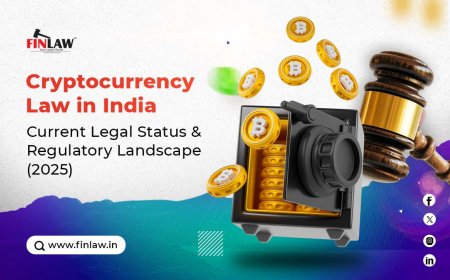Is NFT Legal in India in 2025? Here's What Lawyers Are Saying
Is NFT legal in India in 2025? Discover the current legal status, tax rules, and expert insights for NFT creators and investors in India.

As India rides the wave of digital innovation, Non-Fungible Tokens (NFTs) continue to redefine ownership in the digital age. From digital art to music and gaming assets, NFTs are revolutionizing how creators monetize their work. But despite the buzz, one critical question remains: Is NFT legal in India in 2025?
In this article, we break down the current legal framework, taxation, regulatory challenges, and expert legal insights around the question: "Is NFT legal in India?" so you can navigate the evolving NFT landscape with confidence.
What Are NFTs and Why Are They Popular in India?
NFTs are unique, indivisible digital tokens recorded on a blockchain, often representing digital art, collectibles, in-game assets, or even real-world property. Unlike cryptocurrencies, NFTs are non-fungible, meaning they cannot be exchanged on a one-to-one basis.
In India, NFTs gained popularity around 2021–2022 with celebrities like Amitabh Bachchan and cricketers launching NFT collections. By 2025, NFTs have become more mainstream, especially in sectors like gaming, entertainment, and digital collectibles.
Is NFT Legal in India in 2025? The Current Legal Status
NFTs Are Legal But Not Specifically Regulated
As of now, NFTs are not illegal in India, but they exist in a legal grey zone. There is no dedicated NFT law, but NFTs are recognized as Virtual Digital Assets (VDAs) under the Income Tax Act—bringing them under the government’s financial scrutiny.
The Reserve Bank of India (RBI) and Securities and Exchange Board of India (SEBI) have not issued direct guidelines on NFTs, but they are watching closely. Experts suggest that while NFT trading is currently allowed, it’s operating under broader digital asset laws that can be subject to sudden policy shifts.
Legal Framework Governing NFTs in India
Even without a standalone NFT law, NFTs fall under the jurisdiction of several existing Indian laws:
Income Tax Act, 1961
-
Section 115BBH taxes profits from NFT sales at a flat rate of 30%.
-
Section 194S requires 1% TDS on NFT transfer payments above ₹10,000.
-
Losses from NFT trading cannot be offset against other gains.
Copyright Act, 1957
Buying an NFT does not automatically grant the copyright or reproduction rights of the underlying work. Creators must explicitly transfer Intellectual Property (IP) rights through a separate contract.
Prevention of Money Laundering Act (PMLA), 2002
To prevent misuse for illegal activities, the Indian government is moving to bring NFT platforms under AML/CFT compliance. NFT marketplaces are likely to be considered “reporting entities,” similar to crypto exchanges.
IT Act, 2000
NFT platforms must comply with the Information Technology (Intermediary Guidelines and Digital Media Ethics Code) Rules, 2021, especially regarding the hosting of user-generated content.
Taxation of NFTs in India: What You Need to Know
Key NFT Tax Rules in 2025
|
Aspect |
Details |
|
Tax Rate on Gains |
30% under Section 115BBH |
|
TDS on Transfer |
1% under Section 194S |
|
Deduction of Expenses |
Not allowed except cost of acquisition |
|
Set-off or Carry Forward Losses |
Not permitted |
|
Gifts of NFTs |
Taxable if the market value exceeds ₹50,000 |
|
Non-disclosure Penalty |
Up to 60% taxation under undisclosed income provisions |
Is Trading NFTs Safe in India?
Yes, trading NFTs is permissible but must be done on compliant platforms. It’s crucial to:
-
Maintain detailed records of NFT purchases and sales.
-
Ensure platforms are KYC-compliant and transparent.
-
Avoid anonymous or foreign marketplaces with no regulatory oversight.
What Indian Lawyers Are Saying About NFT Legality
Legal experts highlight the urgent need for a regulatory framework that goes beyond taxation. Here's what some say:
“NFTs offer a great opportunity for creators, but the lack of regulatory clarity and enforceable contracts makes it essential that participants seek legal guidance before launching or investing.” — Adv. P.M. Mishra, International Fintech Lawyer
“NFTs may seem legal now, but the absence of a regulatory structure means investors could be vulnerable to scams, fraud, and IP disputes.” — Rajesh Kapoor, Cyberlaw Advocate
“Until SEBI or RBI clarifies their stance, NFTs will remain in a grey zone. A legal framework is not just overdue—it’s essential.” — Priya Mehra, Digital Finance Attorney
Challenges Facing NFT Adoption in India
Despite growing interest, several challenges persist:
Lack of Regulatory Clarity
Without defined rules, NFT traders are exposed to legal uncertainties and inconsistent interpretations by authorities.
Risk of Scams
Fake NFT listings, rug pulls, and pump-and-dump schemes have impacted investor confidence.
Crypto Dependency
Most NFTs are purchased using cryptocurrencies, which are themselves not legal tender in India.
Environmental Concerns
NFTs using proof-of-work blockchains (like Ethereum pre-merge) face backlash due to their high carbon footprint.
Government Stance and Possible Regulations in the Pipeline
The Indian government has taken several steps toward crypto and VDA regulation. Here’s what could happen next for NFTs:
-
SEBI oversight for investment-oriented NFTs (e.g., fractional real estate NFTs).
-
Consumer protection framework to handle disputes, refunds, and scams.
-
Mandatory registration for NFT marketplaces under the FIU-India regime.
-
Stronger IP laws for digital assets.
Can Indian Artists and Creators Legally Sell NFTs?
Yes. Creators in India can mint and sell NFTs on platforms like OpenSea, Rarible, or WazirX NFT, provided they:
-
Disclose earnings for tax purposes
-
Ensure no copyrighted material is used without proper licensing
-
Include license terms or IP transfer details in the NFT smart contract
How to Stay Compliant While Investing in NFTs
If you're an investor, follow these best practices:
-
Report NFT income on your ITR under VDA gains
-
Maintain invoices, transaction logs, and wallet addresses
-
Trade only on verified platforms
-
Understand the IP rights you're buying
-
Avoid anonymous peer-to-peer transactions
FAQs: Is NFT Legal in India?
Q1. Is NFT legal in India in 2025?
Yes, NFTs are legal but not specifically regulated. They are taxed as Virtual Digital Assets.
Q2. Can I sell NFTs in India?
Yes, creators and investors can buy and sell NFTs legally, but must comply with tax and IP laws.
Q3. Do I need to pay tax on NFT profits?
Absolutely. A flat 30% tax applies, and 1% TDS is deducted at the time of sale.
Q4. Are there any NFT laws in India?
No, but several existing laws like the Income Tax Act, Copyright Act, and PMLA apply.
Q5. Is it safe to buy NFTs?
Yes, if purchased on trusted platforms and with legal awareness. Beware of scams.
Conclusion: NFTs Are Legal, But Caution Is Key
So, is NFT legal in India in 2025? The answer is yes—but with conditions. NFTs are taxed and partially regulated under existing Indian laws, yet the lack of a dedicated legal framework makes it essential for traders, creators, and investors to stay alert and compliant. As the Indian digital asset ecosystem matures, we can expect more clarity and safeguards, but until then, legal awareness and responsible investing are your best tools.
What's Your Reaction?



















